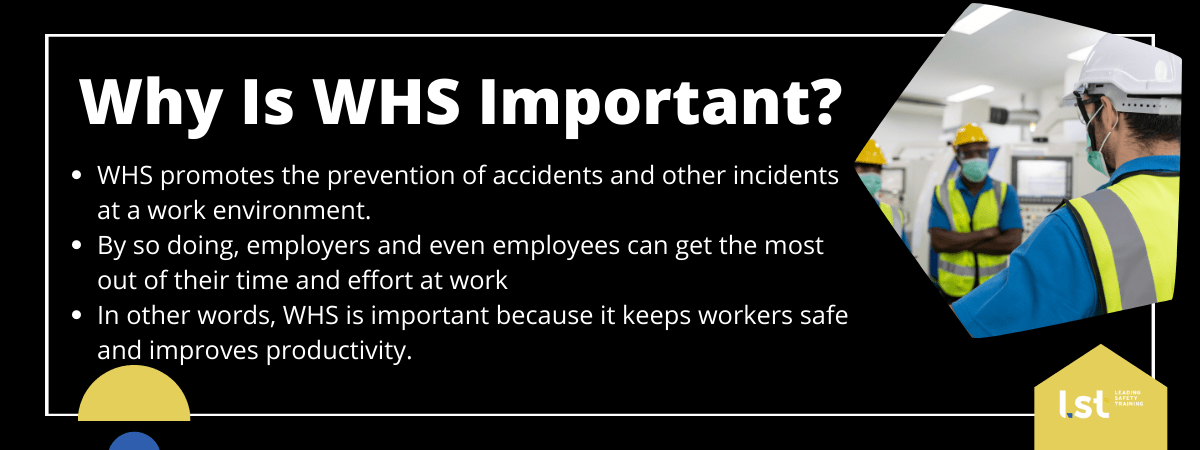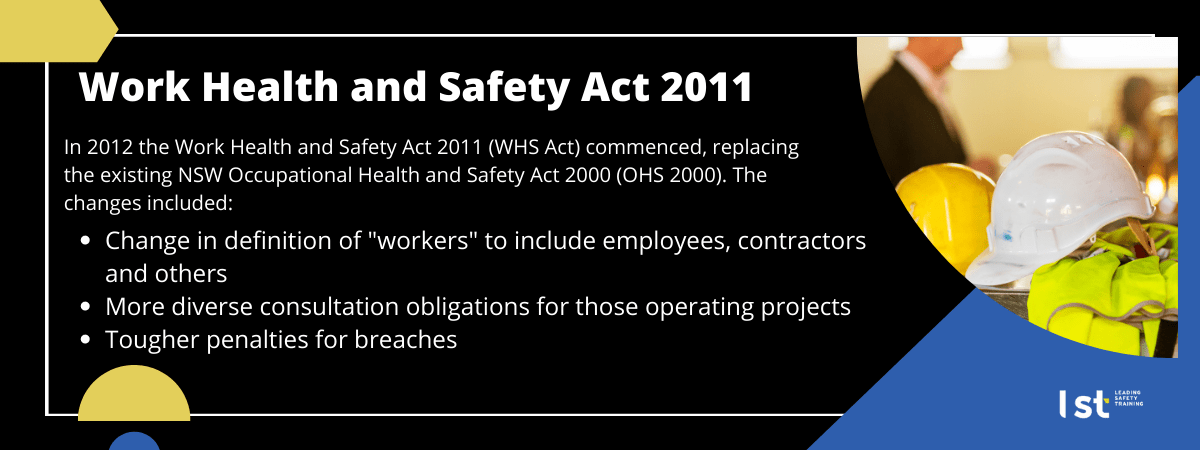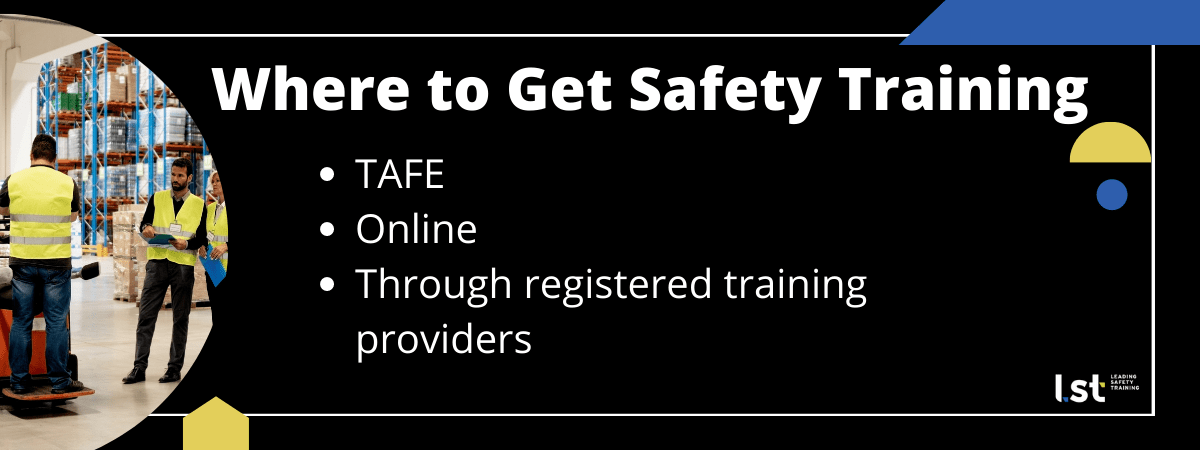Workplace health and safety (WHS) is all about keeping people safe in the workplace. It includes things like ensuring that workplaces are free from hazards, providing training and information on how to safely work in a particular environment, and investigating any accidents or incidents that do occur.
Why is WHS Important in the Workplace
WHS is important because it helps to protect workers from injuries, illnesses and even death. In Australia, there are strict laws in place surrounding WHS, and employers who fail to comply can face heavy fines.
By ensuring that workplaces are safe environments, we can help to prevent accidents and injuries from happening. And when they do happen, having good WHS procedures in place can help to make sure that they’re dealt with quickly and effectively.
What is the Difference Between OHS and WHS?
There is often confusion about the difference between OHS and WHS in Australian workplaces. OHS stands for Occupational Health and Safety, while WHS stands for Workplace Health and Safety. Both terms are used to describe the same thing – the safety of workers in the workplace. However, there is a subtle difference between the two terms.
OHS typically refers to the physical health and safety of workers, while WHS encompasses both physical and mental health and safety. In other words, OHS focuses on protecting workers from risks that could cause them physical harm, while WHS also includes measures to protect workers from psychological risks such as stress.
The term OHS is more commonly used in older legislation and documents, while WHS is the preferred term in more recent legislation and documents. However, both terms are used interchangeably in most Australian workplaces.
So, to sum up, there is no real difference between OHS and WHS – they both refer to the same thing (worker safety in the workplace). However, OHS typically refers to physical safety while WHS also includes mental health and safety.
What is the Important WHS Legislation in Australia?
The most important Work Health and Safety Legislation in Australia is the Work Health and Safety Act 2011. This act establishes a framework to protect the health, safety and welfare of workers and other persons at work. It also sets out the duties of employers, employees and other persons who are involved in work activities.
The Work Health and Safety Act 2011 applies to all workplaces in Australia, whether they are located in an office, factory, construction site or any other type of workplace. The act also applies to all types of work, including manual labour, office work and any other type of work that is carried out in a workplace.
The act includes provisions for the establishment of Safe Work Australia, which is responsible for developing and administering national work health and safety laws. The act also provides for the establishment of Workplace Health and Safety Committees, which are responsible for promoting and monitoring compliance with the act.
Why Is Work Health and Safety Important? Well according to the Work Health and Safety Act 2011, Employers, employees, and other persons who are involved in work activities have a duty to comply with the provisions of the act. The Act is an important piece of legislation that provides a comprehensive framework for protecting the health, safety, and welfare of workers in Australia.
If you have any questions about the Work Health and Safety Act 2011 or its application to your workplace, you should contact Safe Work Australia or your local work health and safety authority.
What are the Consequences for Failing WHS Standards?
If you are a business, knowing why Is work health and safety important? Could save you thousands in fines.
Businesses that fail to meet WHS standards in Australia could be subject to a number of penalties. These can include on-the-spot fines, prosecution and/or imprisonment.
The maximum fine for an individual who contravenes the WHS Act is $300,000, while the maximum fine for a corporation is $3 million. If you are found guilty of a criminal offence under the WHS Act, you may also be sentenced to imprisonment.
Additionally, if your business is found to be non-compliant with WHS standards, you may have your licence to operate suspended or revoked. This could have a major impact on your business, as it would no longer be able to legally operate.
Who Is Responsible for Implementing Best Practice WHS?
The responsibility for implementing best practice WHS at work rests with the employer. However, employees also have a role to play in ensuring their own safety and the safety of others at work.
Employers are required by law to take all reasonably practicable steps to ensure the health and safety of their employees. This includes providing a safe working environment, safe systems of work and adequate training.
Employees also have a duty to take care of their own health and safety, and that of others who may be affected by their actions. They should co-operate with their employer in relation to health and safety matters, and follow any reasonable instructions or procedures that have been put in place.
How Can You Get WHS Training?
It is important for businesses to ensure that their employees are properly trained in workplace health and safety (WHS). This will help to create a safe and healthy work environment, and can also help to avoid potential accidents and injuries.
There are a number of ways that businesses can get WHS training for their employees. One option is to contact a professional training provider. These providers offer a range of courses which can be tailored to the needs of your business.
Alternatively, there are a number of websites which provide free or low-cost WHS training materials. These can be a great option if you have limited time or budget.
How Often Should You Get WHS Training?
As a business owner or manager in Australia, you’re legally required to provide a safe workplace for your employees. This includes ensuring that your staff are properly trained in health and safety procedures. But how often should this training be conducted?
There is no definitive answer, as it will depend on factors such as the type of business you operate, and the nature of the work being done. However, it’s generally recommended that businesses conduct health and safety training at least once per year. This will help to ensure that your employees are up to date with the latest procedures and aware of any changes that may have been made.
If you have any concerns about how often you should be conducting health and safety training, speak to your local WorkSafe authority for advice.
Leading Safety Training and the Importance of WHS
So, there you have it! why Is work health and safety important? WHS is all about keeping people safe in the workplace, and it’s something that we all need to be aware of. Whether you’re an employer or an employee, make sure you know your rights and responsibilities when it comes to WHS. For work health safety training you can trust, turn to the professionals at Leading Safety Training. Leading Safety Training operates industry-certified health and safety committee training, white card training, and HSR training to keep everyone safe at work.




